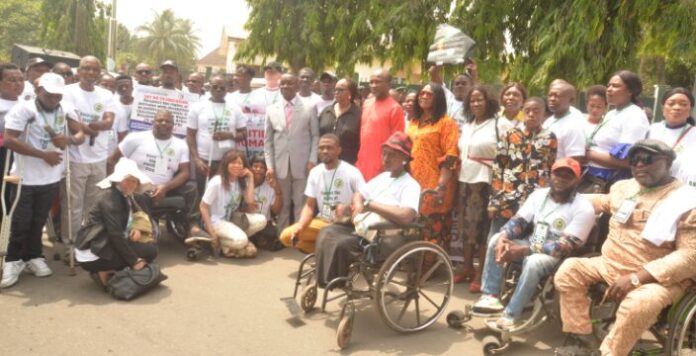In the heart of Nigeria, a poignant tale unfolds, shedding light on the challenges faced by Persons with Disabilities (PWDs). Among them is 12-year-old Kadijat, a girl with albinism who, despite her vulnerability to sun-related health issues, diligently treks every day to hawk fufu, contributing to her family’s survival.
Scientific studies emphasize the heightened risks for children with oculocutaneous albinism, like Kadijat, susceptible to skin lesions and vision problems. Despite the acknowledged risks, she bravely perseveres, driven by the need to support her family, highlighting the urgent need for government intervention.
Tragedy struck in Osun State with the demise of Mr. Gbenga Alegbeleye, a former government employee who succumbed to a lack of sign language interpretation at the hospital. His story underscores the critical necessity for accessible healthcare for speech-impaired individuals.
Despite the Federal Government’s warning to shut non-compliant public buildings, a nationwide investigation reveals a glaring lack of wheelchair accessibility, perpetuating the challenges faced by PWDs in their daily lives.
The visually impaired community struggles in their pursuit of education due to the absence of braille materials and essential training. Telecommunication becomes a luxury, as many cannot afford the Android phones equipped with apps designed for the blind, further exacerbating their isolation in an already challenging environment.
Nigeria, unfortunately, remains a country where the rights of PWDs are routinely violated. Discrimination, stigmatization, and a lack of inclusivity persist, painting a stark picture of the uphill battle these individuals face.
The healthcare sector, both public and private, adds to the adversity faced by the deaf community, lacking sign language interpreters and hindering effective communication with medical practitioners.
A brave hearing-impaired woman shares her ordeal, expressing the frustration of being misunderstood in medical facilities. Her plea for more trained language interpreters and their inclusion in public institutions echoes the broader call for systemic change.

Stakeholders, including community-based organizations, non-governmental entities, security agencies, and the disability communities, unite to raise awareness and propose solutions. Mrs. Funmi Abdullahi, a JONAPWD member, passionately urges the Osun State House of Assembly to expedite the disability bill’s passage, emphasizing its potential to address the myriad challenges faced by PWDs.
Taking a proactive stance, the Center for Women’s Health and Information launches the Hope Project in Lagos and Osun. Beyond safeguarding girls and women with disabilities from Gender-Based Violence, this initiative aims to spotlight and combat the multifaceted threats faced by PWDs.
In a nation at the crossroads of change, the call for inclusivity, empathy, and governmental action resonates. As stakeholders collaborate and initiatives like the Hope Project take root, there is hope for a more compassionate and supportive future for Nigeria’s PWDs.
#PWDStruggles #InclusiveNigeria #HopeProjectNG


